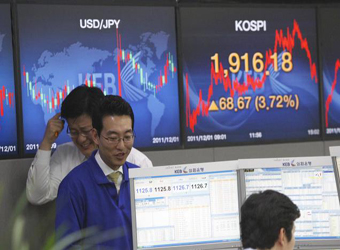Asia markets were a mixed bag on Monday as Australia gained after it appeared to dodge a possible downgrade for now of its treasured top sovereign rating and Japan fell despite better-than-expected trade data.
The Australian benchmark ASX 200 closed up 0.53 percent or 29.172 points at 5,566.1, as Australia Treasurer Scott Morrison announced a budget deficit of A$36.5 billion ($26.6 billion) in the current fiscal year ending June 30, 2017, or 2.1 percent of gross domestic product (GDP).
The budget shortfall was lower than the original prediction of A$37.1 billion (2.2 percent of GDP). Australia’s budget deficit is also set to widen over the next four years.
Morrison also reaffirmed a pledge to return to surplus by June 2021, through spending cuts and tax hikes although not before wider deficits than previously forecast and with several of the most contentious measures previously blocked in the Senate.
Investors noted S&P Global said the budget update had no immediate effect on AAA (triple A) credit rating it has on a negative outlook, but warned the savings and taxes are needed to stem a possible downgrade.
Japan’s Nikkei 225 fell 0.44 percent, breaking 11 straight session gains.
Japan’s November exports fell 0.4 percent year-on-year, compared to a Reuters poll expecting a 2 percent decline, boosted by a weaker yen and recovery in overseas demand.
Japanese imports fell 8.8 percent, also better than the Reuters forecast of a 12.6 percent decline. However, the trade surplus was narrower than expected at 153 billion yen ($1.3 billion), compared to a surplus of 227 billion yen expected.
In South Korea, the Kospi was near flat, while Hong Kong’s Hang Seng fell 0.77 percent.
Chinese markets were mixed, with the Shanghai composite flat while the Shenzhen composite was down 0.208 percent.
Chinese policymakers’ property market cooling measures appear to be coming through, with November new home prices up 0.6 percent from the previous month, slowing from October’s 1.1 percent increase.
China’s largest property developer China Vanke fell to a four month low, down 4.72 percent to 21.40 yuan per share. The Shenzhen-listed company said on Sunday it would terminate a key deal to acquire a property development arm of Shenzhen Metro Group after failing to get approval from some shareholders, Reuters reported.
A Chinese warship seized a U.S. underwater drone in the South China Sea, which triggered a formal diplomatic protest and a demand for its return last Friday. The political fallout continued over the weekend even after Beijing agreed to return the drone, with U.S. President-elect Donald Trump taking jabs at China on Twitter.
“News that China will return the captured U.S. drone may restore a little confidence this morning. However, the fact remains that this incident is a reminder to markets that geopolitical tensions may deserve more risk premium under the Trump administration,” said Ric Spooner, chief market analyst at CMC Markets, in a note on Monday.
Investors will also eye the Bank of Japan’s two-day monetary policy meeting starting on Monday and Hong Kong’s November unemployment rate.
In the broader currency market, the dollar slipped to 102.7 against a basket of currencies, compared to levels as high as 103 last week. The yen was stronger at 117.35 against the greenback as of 12:50 pm HK/SIN, while the Australian dollar was at $0.7289 after the national budget announcement.
The Malaysian ringgit was weaker at 4.477 against the greenback, at a low not seen since the 1998 Asian Financial Crisis. The Southeast Asian currency has been under considerable pressure ever since the post-Election day dollar rally.
Oil prices were higher during Asian trade. U.S. crude were up 0.85 percent to $52.34 a barrel while global benchmark Brent futures traded up 0.67 percent to $55.58.
U.S. stocks dipped slightly on Friday following geopolitical tension between the U.S. and China.
The Dow Jones industrial average slipped 0.04 percent to 19,843.41, the S&P 500 index ended down 0.18 percent to 2,258.07, while the Nasdaq composite finished 0.44 percent lower to 5,437.16.
Source: CNBC


